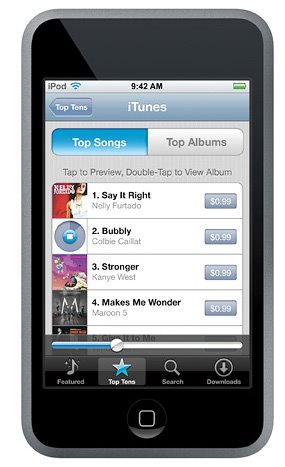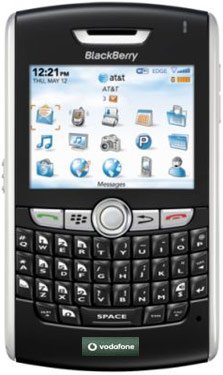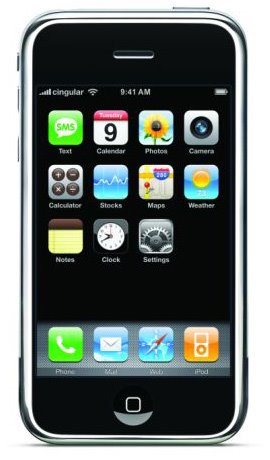Apple CEO Steve Jobs opened the 2010 Worldwide Developers Conference on 8th, June by announcing the latest iPhone incarnation, the iPhone 4G. It will be available exclusively with AT&T starting June 24, with 5 countries at launch (US, France, Germany, UK, Japan), with 18 more following in July. The price with service is fair--US$199 for the 16GB phone or US$299 for the 32GB device--and both models come in white and black versions. Then let's have a close look at the new iPhone 4G: How does the new iPhone improved compare with the iPhone 3G S?
Display
The iPhone 4G features a 940 * 640-pixel (or 326 pixels per square inch) Apple calls it a "Retina Display", which is four times the resolution of previous iPhone models. It's rated at 326ppi, which Apple claims is beyond the human eye's limit of distinction. Check out an example of the new screen up against the iPhone 3G after the break. Similar to the iPad, it's an IPS display, offering 800:1 contrast. The thickness of it is only 9.3 millimeters, 24% thinner than iPhone 3GS. Apple Company says, iPhone 4G is the thinnest smartphone in the world.
New features of iPhone 4G
Firstly, iPhone 4G comes with iOS 4, the newest version of the world's most advanced mobile operating system. With over 100 new features, it includes Multitasking, Folders, enhanced Mail, deeper Enterprise support and Apple's new iAd mobile advertising platform. With Multitasking, users can now instantly switch between any of their apps while preserving battery life. With Folders, users can easily organize their apps into collections by simply dragging one app on top of another. A folder is automatically created and named based on the category of apps selected. Users can change the name of any folder at any time. In addition, users can now customize their lock and home screens with an array of supplied wallpapers or with any of the photos on their phone.
Secondly, the iPhone 4G will feature the same A4 chip that's found in the iPad. The result is a faster processor plus improved battery life (its supports seven hours of talk time on 3G networks, up to 10 hours of web browsing on Wi-Fi and up to six hours on 3G, and up to 10 hours of video playback and up to 40 hours of audio playback). Thirdly, the iPhone 3GS gave us a compass, but the iPhone 4G raises the bar by offering a three-axis gyroscope. Like on an airplane, you'll get pitch, roll, and yaw, and it's tied with the accelerometer to provide six-axis motion sensing. Though by all means it will be useful to app developers, it also just looks like a lot of fun.
Moreover, the iPhone 4G's front-facing camera is a 640-by-480-pixel camera (three-tenths of a megapixel, if you're curious) designed to be used primarily with the new FaceTime video-chat system, though it will also work well as a way to take self-portraits. With the FaceTime, you can see your loved ones and friends anywhere there is Wi-Fi. Using FaceTime is as easy as making a regular voice call, with no set-up required, and you can instantly switch to the rear camera to show others what you are seeing with just a tap.
Camera Changes and Powerful Multimedia functions
iPhone 4G features a new 5 megapixel autofocus camera with a 5x dig ital zoom, a backside illuminated sensor and built-in LED flash that allows you to take amazing pictures even in low light and dark environments. iPhone 4G lets you record and edit incredible HD video and the popular tap to focus feature now works while recording video. You can use the iPhone 4Gs LED flash for both still photography and video recording. The demo looks great, even if the iPhone isn't the first cell phone to offer this capability. The new iMovie? app for iPhone lets you combine movie clips, add dynamic transitions and themes and include photos and music, and users can buy it for just $4.99 through the App Store right on their phone.
With its' build-in powerful multimedia player, iPhone 4G supports lots of audio and video formats. Such as: audio formats: AAC (8 to 320 kbps), Protected AAC (from iTunes Store), HE-AAC, MP3 (8 to 320 kbps), MP3 VBR, Audible (2, 3 and 4), Apple Lossless, AIFF and WAV. and video formats: H.264, up to 720 high-definition at a c onstant frames per second, Main profile up to level 3.1 with AAC-LC audio up to 160 kbps, 48khz, stereo audio in .M4V, .MP4, and .MOV file formats; MPEG-4 video up to 2.5 mbps, 640 by 480 pixels, 30 frames per second, Simple profile with AAC-LC audio format up to 160 kbps, 48khz, stereo audio in .M4V, .MP4, and .MOV file formats; Motion JPEG (M-JPEG) up to 35 Mbps, 1280 by 720 pixels, 30 frames per second, with ulaw audio format and PCM stereo audio in. AVI file format.
But, it is a small shortcoming that iPhone 4G could not play DVDs. If you want to play DVD with it, you may use Nidesoft DVD Ripper which helps you convert DVD to all popular video or audio formats easily to convert DVD files into iPhone 4G compatible formats or you have some video or audio files which iPhone 4G could not support in some case, you may select Nidesoft Video Converter to convert all other video files into iPhone 4G. It is powerful video conversion software which could convert video and au dio files between all popular formats. With these two assistant software, you may enjoy your DVD or any video and audio files in iPhone 4G at anytime and anywhere.
Conclusion
Through the above description, we know iPhone 4G have improved much more functions than iPhone 3GS, such as FaceTime, Processor, Camera, Gyroscope and application system and so on. And, "iPhone 4G is the biggest leap since the original iPhone," said Steve Jobs, Apple's CEO. So, iPhone 4G is filled with the hope of us. Of course, nobody knows the result before it is published; let's just wait for its official release date of June 24th.
iAutoblog the premier autoblogger software






0 comments:
Post a Comment